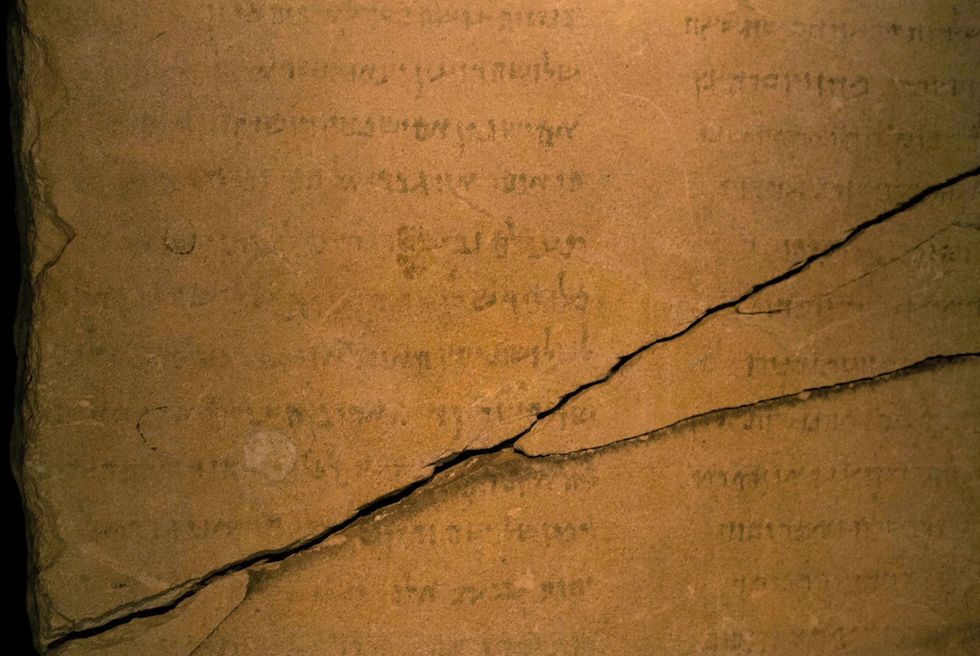An author and Bible expert who has spent a great deal of time analyzing recent archaeological discoveries said that he has been "blown away" by an ancient tablet that was discovered back in 2000 — one that has caused an "earthquake" in the biblical studies field.
"The one [find] that really blew me away was the Gabriel Revelation ... a first century stone tablet that was discovered around the year 2000 on the other side of the Jordan River," author Robert J. Hutchinson told The Church Boys podcast.
Hutchinson, who describes this find among many others in his new book, "Searching for Jesus: New Discoveries in the Quest for Jesus of Nazareth — and How They Confirm the Gospel Accounts," said that the tablet, which is dated to the first century B.C., is written in Hebrew and mentions the angel Gabriel.
"[It] speaks about ... a messiah who would suffer, die and perhaps even rise again. This has just been kind of an earthquake," Hutchinson said. "The implications of it haven't really filtered down to ordinary scholars, and seminaries and so on — and even, of course, into the media."
Listen to him explain below (starts at the 38:00 mark):
The author said that the discovery, which has attracted attention inside biblical and archaeological circles, is notable due to the fact that it "basically shows ... that there were Jews in Jesus' time who were expecting a suffering messiah."
Critics have spent a century questioning the New Testament narrative, Hutchinson said, based on the claim that the story surrounding Jesus' divinity and the reason for his crucifixion were conjured up after the fact — something that he believes the tablet dismisses.
Those opposed to the narrative in the gospels said that the Jews were expecting a conquering hero who would reestablish the Davidic kingdom and not a savior who would suffer, die and rise again, the author maintains.
"This theme of a suffering messiah wasn't just made up by the Christian community as an apologetic device after the fact to explain the scandal that Jesus was crucified," he said. "For literally a century scholars have said that. It was one of the pillars for questioning the reliability of the New Testament."
Much of the Gabriel Revelation is indiscernible, though a portion of it was translated into English by the Shalom Hartman Institute, among others. And as the Associated Press reported in 2013, scholars continue to debate its meaning.
The stone first emerged in 2008 in media when Bible scholar Israel Knohl posited that a line read "in three days you shall live."
What is agreed on, however, is that the tablet displays an apocalyptic vision of an attack on Jerusalem in which God arrives on chariots to defend the city, the AP reported.
Hutchinson also detailed some of the other findings that he believes corroborate the biblical narrative, explaining that he believes much of the criticism of the Bible is built on defunct "presuppositions of liberal biblical scholarship."
Today, he believes that the tides have turned even among skeptical scholars, whom he focuses most on in "Searching for Jesus."
 The Gabriel Stone is displayed at an exhibition at the Israel Museum in Jerusalem, Tuesday, April 30, 2013. An ancient stone with mysterious Hebrew writing and featuring the archangel Gabriel is being displayed in Israel, even as scholars continue to argue about what the inscription means. (AP Photo/Sebastian Scheiner)
The Gabriel Stone is displayed at an exhibition at the Israel Museum in Jerusalem, Tuesday, April 30, 2013. An ancient stone with mysterious Hebrew writing and featuring the archangel Gabriel is being displayed in Israel, even as scholars continue to argue about what the inscription means. (AP Photo/Sebastian Scheiner)
"Many of the fundamental assumptions that have guided New Testament research over 100 or 150 years were being challenged by the skeptical scholars themselves," he said of more recent dynamics. "Many of the concepts and ideas and the assumptions that they had held a century ago [were] no longer held by the top scholars and yet a lot of this stuff hadn't filtered down to the media."
Critiques of the Bible came from discoveries that were made by critical scholars a century ago, Hutchinson posited, arguing that these individuals then made unproven assumptions about those finds, which were perpetuated for decades.
"I'm not really writing about conservative Christians who try to defend Bible," he said. "Skeptical secular experts have made discoveries that make them question some of these older ideas and assumptions about who Jesus was."
While he said that the questioning is leading to a confirmation of Jesus' overall biblical portrait, he said that not everyone agrees that the Bible is historically accurate. Still, he believes that the discoveries continue to support the overall narrative and descriptions.
Find out more about "Searching for Jesus" here.
Follow the author of this story on Twitter and Facebook:

 The Gabriel Stone is displayed at an exhibition at the Israel Museum in Jerusalem, Tuesday, April 30, 2013. An ancient stone with mysterious Hebrew writing and featuring the archangel Gabriel is being displayed in Israel, even as scholars continue to argue about what the inscription means. (AP Photo/Sebastian Scheiner)
The Gabriel Stone is displayed at an exhibition at the Israel Museum in Jerusalem, Tuesday, April 30, 2013. An ancient stone with mysterious Hebrew writing and featuring the archangel Gabriel is being displayed in Israel, even as scholars continue to argue about what the inscription means. (AP Photo/Sebastian Scheiner)


